A new year, so a good time to look ahead to what 2019 may bring. The year will undoubtedly have its share of surprises, but there are always some things we can know for sure.
Among these is the inevitable progression of time, and thus the aging out of cardinals. In 2019, ten cardinals will celebrate their 80th birthday and so lose their right to participate in a conclave for the election of a new pope, as well as any duties they may have in the curia. The umber of cardinal-electors will drop from 124 to 114. Still a sufficient number, but Pope Francis has shown that he wants to keep the electors as close to their theoretical maximum of 120 (or over it, as the case is now), so a consistory may be in the books sometime towards the end of the year, or at the start of 2020.
The cardinals aging out are:
 30 January: Alberto Cardinal Suárez Inda, archbishop emeritus of Morelia, Mexico
30 January: Alberto Cardinal Suárez Inda, archbishop emeritus of Morelia, Mexico- 11 March: Orlando Beltran Cardinal Quevedo, archbishop emeritus of Cotabato, Philippines
- 8 April: Edwin Frederick Cardinal O’Brien, Grand Master of the Equestrian Order of the Holy Sepulchre of Jerusalem
- 27 April: Stanislaw Cardinal Dziwisz, archbishop emeritus of Kraków, Poland (pictured at right)
- 31 July: John Cardinal Tong Hon, bishop emeritus and apostolic administrator of Hong Kong, China
- 16 August: Seán Baptist Cardinal Brady, archbishop emeritus of Armagh, Northern Ireland
- 7 October: Laurent Cardinal Monsengwo Pasinya, archbishop emeritus of Kinshasa, Democratic Republic of the Congo
- 11 October: Zenon Cardinal Grocholewski, prefect emeritus of the Congregation for Catholic Education
- 14 October: Edoardo Cardinal Menichelli, archbishop emeritus of Ancona-Osimo, Italy
- 15 October: Telesphore Placidus Cardinal Toppo, archbishop emeritus of Ranchi, India
Who may replace these cardinals among the electors is guesswork, as Pope Francis has never felt bound to pick his cardinals from the traditional places. Still, the list above could give some hints and we may assume that the Holy Father will choose cardinals for countries who no longer have any. That said, possible candidates could be Archbishop Marek Jedraszewski of Kraków, Archbishop Eamon Martin of Armagh and Archbishop Fridolin Ambongo Besungu of Kinshasa. Another source of new cardinals are the papal visits Pope Francis makes. He has made some of hosts cardinals in the past before. It may therefore be possible that we may see new cardinals from Panama, the Arabian peninsula, Morocco, Bulgaria, Macedonia, Romania (all confirmed visits), and perhaps Japan, Mozambique and Uganda (rumoured visits).
Closer to home, a number of dioceses will be looking forward to new bishops this year. In the Netherlands, the Diocese of Haarlem-Amsterdam has just received a coadjutor bishop, although the sitting ordinary, Bishop Jos Punt, expects to remain in office until his 75th birthday in 2021. Health permitting, of course.
 In Belgium, Bishop Luc Van Looy of Ghent (pictured at left) has already had his retirement accepted. At 77, he completed a two-year extension to his mandate last year. He is to remain in office until the appointment and installation of his successor. Namur’s Bishop Remy Vancottem is, at 75, also past retirement age, so the southeastern diocese may see a new bishop before the year is out as well.
In Belgium, Bishop Luc Van Looy of Ghent (pictured at left) has already had his retirement accepted. At 77, he completed a two-year extension to his mandate last year. He is to remain in office until the appointment and installation of his successor. Namur’s Bishop Remy Vancottem is, at 75, also past retirement age, so the southeastern diocese may see a new bishop before the year is out as well.
In Germany, Bishop Konrad Zdarsa of Augsburg will turn 75 in June. Among the country’s auxiliary bishops, there is room in Freiburg im Breisgau where erstwhile auxiliary Bishop Michael Gerber was appointed to Fulda in December.
In the headline-making department, there is of course next month’s meeting of the heads of all the bishops’ conferences in Rome, to discuss a unified Church response to the abuse crisis. Among the participants will be Bishop Hans van den Hende for the Netherlands, Cardinal Jozef De Kesel for Belgium, Cardinal Reinhard Marx for Germany and Bishop Czeslaw Kozon for Scandinavia.
Currently gearing up in Panama, the World Youth Days will take place from 22 to 27 January. The first group of Dutch pilgrims have departed for the Central American country today, with more to follow. Among them will be Bishops Everard de Jong and Jan Hendriks. Bishop de Jong is again replacing Bishop Rob Mutsaerts, who has decided to stay at home as he is recovering from unplanned – and not further specified – surgery. Last year, Bishop Mutsaerts elected not to take part in the Synod assembly on youth and vocation in Rome. Bishop de Jong went in his stead.
 In October, the Synod of Bishops will gather again for a special assembly for the Pan-Amazonian region, to discuss the specific challenges for the Church there. The expectations are high, as many assume to what will be decided there, especially on the topic of married priests, will have global consequences. Participation in the special assembly is limited to bishops from the area, which means there is a minute Dutch link, at least when it comes to language, in the person of the bishop of Paramaribo, Msgr. Karel Choennie. Bishop Choennie is a member of the pre-synodal council preparing the special assembly in cooperation with Synod of Bishops’ general secretariat.
In October, the Synod of Bishops will gather again for a special assembly for the Pan-Amazonian region, to discuss the specific challenges for the Church there. The expectations are high, as many assume to what will be decided there, especially on the topic of married priests, will have global consequences. Participation in the special assembly is limited to bishops from the area, which means there is a minute Dutch link, at least when it comes to language, in the person of the bishop of Paramaribo, Msgr. Karel Choennie. Bishop Choennie is a member of the pre-synodal council preparing the special assembly in cooperation with Synod of Bishops’ general secretariat.
2019 will undoubtedly bring much to be discussed in (social) media, and there is still plenty being carried over from previous years. Keeping track of everything, let alone formulating thoughts and responses can sometimes be a challenge, but it’s probably a good idea to remember that not finding words or timely responses does not mean one does not care. There are many opinions, and many eloquent ones at that, to be found everywhere. And, perhaps more importantly, there are also answers to be found in the past. After all, what was true and good in the past remains true and good now. That is something to remember when we are confronted with questions and developments which seem to challenge our beliefs, understanding and even faith. We have a deposit of faith and exegesis to fall back on, and many of today’s questions and challenges are not new ones.
Photo credit: [1] Jarosław Roland Kruk / Wikipedia, licence: CC-BY-SA-3.0, [2] kerknet.be
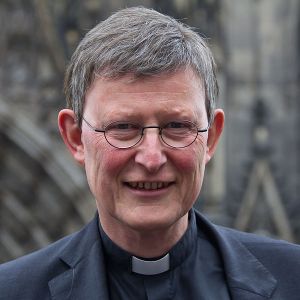 While the letter by Cardinal Woelki, Archbishop Schick and Bishops Zdarsa, Hanke, Ipolt, Voderholzer and Oster received much attention in the media, the signatories themselves treated it as a normal matter of correspondence. Cardinal Woelki, who was visiting Ukraine when the news broke, expressed his surprise at the hype and the talk about dissent. Presenting the questions about intercommunion to Rome was not so much a matter of going against his fellow bishops, but rather came from the importance of the matter: “With several bishops, we were convinced that it would be good to universally coordinate the solution that we have discussed and established here, with an eye on the unity of the Church and the common ground with the other particular churches.” Cardinal Woelki is not so much opposed to the proposals from the conference, to allow non-Catholic spouses of Catholics to receive Communion with their partner on a case-by-case basis, but does not think it is a decision that should be made by the German bishops alone.
While the letter by Cardinal Woelki, Archbishop Schick and Bishops Zdarsa, Hanke, Ipolt, Voderholzer and Oster received much attention in the media, the signatories themselves treated it as a normal matter of correspondence. Cardinal Woelki, who was visiting Ukraine when the news broke, expressed his surprise at the hype and the talk about dissent. Presenting the questions about intercommunion to Rome was not so much a matter of going against his fellow bishops, but rather came from the importance of the matter: “With several bishops, we were convinced that it would be good to universally coordinate the solution that we have discussed and established here, with an eye on the unity of the Church and the common ground with the other particular churches.” Cardinal Woelki is not so much opposed to the proposals from the conference, to allow non-Catholic spouses of Catholics to receive Communion with their partner on a case-by-case basis, but does not think it is a decision that should be made by the German bishops alone.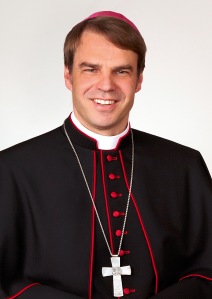 The most extensive explanation for signing the letter comes from Bishop Stefan Oster of Passau. In an article published in the diocesan magazine and
The most extensive explanation for signing the letter comes from Bishop Stefan Oster of Passau. In an article published in the diocesan magazine and 

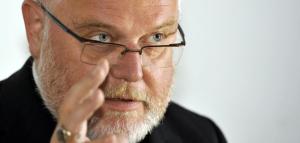 Cardinal Reinhard Marx, president of the German Bishops’ Conference, responded with a letter to all German bishops – a decision motivated by the fact that the letter concerns a decision made by the entire conference and was sent to the Holy See and the Apostolic Nuncio. In his response, he emphasises that no decision has been made to allow non-Catholics to receive Communion, but that there is a working document which may still be amended or changed. The cardinal also reminds the authors that bishops’ conferences and individual bishops have the right, according to canon law, to determine when Holy Communion can be given licitly to non-Catholics.
Cardinal Reinhard Marx, president of the German Bishops’ Conference, responded with a letter to all German bishops – a decision motivated by the fact that the letter concerns a decision made by the entire conference and was sent to the Holy See and the Apostolic Nuncio. In his response, he emphasises that no decision has been made to allow non-Catholics to receive Communion, but that there is a working document which may still be amended or changed. The cardinal also reminds the authors that bishops’ conferences and individual bishops have the right, according to canon law, to determine when Holy Communion can be given licitly to non-Catholics. Deacon Jesús Mauricio Meneses Santiago (pictured, fourth from the left) is Colombian. He came to the Archdiocese of Utrecht as one of four religious, wanting to do something in return for the Dutch missionaries who had come to Colombia in the past. His three fellow religious returned home over the years, but Deacon Meneses Santiago decided to stay. He says: “That was not an easy choice. But I wanted to remain true to my calling. And I am happy. The Netherlands have stolen my heart and I feel at home here. My vocation is God’s initiative, I am here for a reason. I will continue this mission that God has entrusted me with.”
Deacon Jesús Mauricio Meneses Santiago (pictured, fourth from the left) is Colombian. He came to the Archdiocese of Utrecht as one of four religious, wanting to do something in return for the Dutch missionaries who had come to Colombia in the past. His three fellow religious returned home over the years, but Deacon Meneses Santiago decided to stay. He says: “That was not an easy choice. But I wanted to remain true to my calling. And I am happy. The Netherlands have stolen my heart and I feel at home here. My vocation is God’s initiative, I am here for a reason. I will continue this mission that God has entrusted me with.”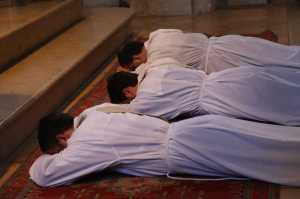 Diocese of Eichstätt, ordained by Bishop Gregor Maria Hanke
Diocese of Eichstätt, ordained by Bishop Gregor Maria Hanke Archdiocese of Paderborn, ordained by Bishop Manfred Grothe
Archdiocese of Paderborn, ordained by Bishop Manfred Grothe Bishop Gerard de Korte, bishop-elect of ‘s-Hertogenbosch and Apostolic Administrator of Groningen-Leeuwarden: “As far as I can see the Pope tries, in the first place, to be a pastoral teacher. … In Amoris laetitia Francis pleads for an inclusive Church. The Pope does not want to build walls, but bridges. People who have failed in relationships are also a part of the Church and must be able to continue with their lives. Wise pastors can, in the privacy of pastoral encounter, support failing people and help them, so that they can continue with the journey of their lives. It is about continuous dialogue with people who, even when they have fallen short, are and remain God’s creatures.”
Bishop Gerard de Korte, bishop-elect of ‘s-Hertogenbosch and Apostolic Administrator of Groningen-Leeuwarden: “As far as I can see the Pope tries, in the first place, to be a pastoral teacher. … In Amoris laetitia Francis pleads for an inclusive Church. The Pope does not want to build walls, but bridges. People who have failed in relationships are also a part of the Church and must be able to continue with their lives. Wise pastors can, in the privacy of pastoral encounter, support failing people and help them, so that they can continue with the journey of their lives. It is about continuous dialogue with people who, even when they have fallen short, are and remain God’s creatures.” Bishop Jan Hendriks, Auxiliary Bishop of Haarlem-Amsterdam: “The Exhortation has a very strong pastoral spirit. The text breathes understanding and love for all people. Nothing is being rationalised or denied, no new doors are opened that were closed, but throughout the entire document there is a warm, ‘inclusive’ spirit: you belong, even when the situation you are in is not perfect. Besides, we are all people “on our way”. Developing what’s good and involving people where possible is the starting point of the ‘divine pedagogy’ that the document intends to promote. Teaching remains teaching, but what matters here is the approach of people and that is open, warm and pastoral.”
Bishop Jan Hendriks, Auxiliary Bishop of Haarlem-Amsterdam: “The Exhortation has a very strong pastoral spirit. The text breathes understanding and love for all people. Nothing is being rationalised or denied, no new doors are opened that were closed, but throughout the entire document there is a warm, ‘inclusive’ spirit: you belong, even when the situation you are in is not perfect. Besides, we are all people “on our way”. Developing what’s good and involving people where possible is the starting point of the ‘divine pedagogy’ that the document intends to promote. Teaching remains teaching, but what matters here is the approach of people and that is open, warm and pastoral.” Archbishop Stefan Heße, Archbishop of Hamburg: “The Pope is aware of the realities of life of the people of today. In the past decades this reality has changed more than in the centuries before. On the other hand, Francis makes clear: we do not reject our ideals. But we must consider anew how people can live according to them. We must succeed in building a stable bridge between ideal and reality. The Pope consciously made no new regulations. He rather wants to provide the means to promote the formation of people’s conscience.”
Archbishop Stefan Heße, Archbishop of Hamburg: “The Pope is aware of the realities of life of the people of today. In the past decades this reality has changed more than in the centuries before. On the other hand, Francis makes clear: we do not reject our ideals. But we must consider anew how people can live according to them. We must succeed in building a stable bridge between ideal and reality. The Pope consciously made no new regulations. He rather wants to provide the means to promote the formation of people’s conscience.” Archbishop Heiner Koch, Archbishop of Berlin: “I see this text as a great invitation to the local Churches, to commit ourselves even more to marriage and family, in marriage preparation, the guidance of married couples, but also in the attention to remarried divorcees and single parents. … Pope Francis rejects any “cold bureaurcratic morality” and describes all pastoral care as “merciful love”, which is “ever ready to understand, forgive, accompany, hope, and above all integrate” (n. 312).
Archbishop Heiner Koch, Archbishop of Berlin: “I see this text as a great invitation to the local Churches, to commit ourselves even more to marriage and family, in marriage preparation, the guidance of married couples, but also in the attention to remarried divorcees and single parents. … Pope Francis rejects any “cold bureaurcratic morality” and describes all pastoral care as “merciful love”, which is “ever ready to understand, forgive, accompany, hope, and above all integrate” (n. 312). Msgr. Andreas Kutschke, Diocesan Administrator of Dresden-Meißen: “The text reminds us that the loving God cares for every person and wants him to grow towards Him. That is our good news to the whole of society. The actions of the Church regarding marriage and family must always direct themselves to that. The challenges of the Gospel should not be concealed, but addressed in a timely and comprehensible manner. That is the tone of this multilayered text.”
Msgr. Andreas Kutschke, Diocesan Administrator of Dresden-Meißen: “The text reminds us that the loving God cares for every person and wants him to grow towards Him. That is our good news to the whole of society. The actions of the Church regarding marriage and family must always direct themselves to that. The challenges of the Gospel should not be concealed, but addressed in a timely and comprehensible manner. That is the tone of this multilayered text.” Archbishop Ludwig Schick, Archbishop of Bamberg: “The Pope shows himself a realist in Amoris laetitia. He knows that marriage and family need special attention in Church and society today, so that they can really be lasting communities of love. That is why, in addition to the fundamental statements, based on the Bible and the Tradition of the Church, about the beauty, richness, value and necessity of marriage, it is important for the Pope that marriage preparation and the guidance of families gets a closer look. State and society, employers, associations and individuals are encouraged to support marriage and family more and give them the necessary assistance.”
Archbishop Ludwig Schick, Archbishop of Bamberg: “The Pope shows himself a realist in Amoris laetitia. He knows that marriage and family need special attention in Church and society today, so that they can really be lasting communities of love. That is why, in addition to the fundamental statements, based on the Bible and the Tradition of the Church, about the beauty, richness, value and necessity of marriage, it is important for the Pope that marriage preparation and the guidance of families gets a closer look. State and society, employers, associations and individuals are encouraged to support marriage and family more and give them the necessary assistance.” Bishop Luc Van Looy, Bishop of Ghent: “Amoris laetitia is in the first place a pastoral and not a doctrinal document. This means that it departs from reality as it exists in all its complexity and diversity. That reality is listened to, and not in the first place condemned. The good that is present must be promoted and given the chance to grow. A pastoral approach means: walking together (synodal) in joy (laetitia), but also in difficult times and crises that people go through in relationships and the raising of children. This must happen with sensitivity, with a lot of respect, tactfully and patiently, in dialogue and without preconceptions. Secondly, this pastoral approach is an inclusive approach. This means that no one is excluded. That is the baseline, if you will, of the entire document, which can be summarised in the key words in the title of the important eighth chapter: Accompanying, discerning and integrating. The Church must do all to let people, in whatever situation they find themselves, be part of the community. That returns like a refrain.”
Bishop Luc Van Looy, Bishop of Ghent: “Amoris laetitia is in the first place a pastoral and not a doctrinal document. This means that it departs from reality as it exists in all its complexity and diversity. That reality is listened to, and not in the first place condemned. The good that is present must be promoted and given the chance to grow. A pastoral approach means: walking together (synodal) in joy (laetitia), but also in difficult times and crises that people go through in relationships and the raising of children. This must happen with sensitivity, with a lot of respect, tactfully and patiently, in dialogue and without preconceptions. Secondly, this pastoral approach is an inclusive approach. This means that no one is excluded. That is the baseline, if you will, of the entire document, which can be summarised in the key words in the title of the important eighth chapter: Accompanying, discerning and integrating. The Church must do all to let people, in whatever situation they find themselves, be part of the community. That returns like a refrain.” Bishop Rudolf Voderholzer, Bishop of Regensburg: “Amoris laetitia is an attractive and inviting text, a hymn on God-given love. It contains neither generalisations nor blanket solutions. I hope very much that chapters two and three, which recall in a new and fresh way the Biblical and doctrinal basis of conjugal love, will be read and internalised. Of course the Holy Father especially takes those situations into account, in which people are threatening to fail or have failed to achieve the ideal. It is the wish of the Church, the Pope says, “to help each family to discover the best way to overcome any obstacles it encounters” (AL 200).”
Bishop Rudolf Voderholzer, Bishop of Regensburg: “Amoris laetitia is an attractive and inviting text, a hymn on God-given love. It contains neither generalisations nor blanket solutions. I hope very much that chapters two and three, which recall in a new and fresh way the Biblical and doctrinal basis of conjugal love, will be read and internalised. Of course the Holy Father especially takes those situations into account, in which people are threatening to fail or have failed to achieve the ideal. It is the wish of the Church, the Pope says, “to help each family to discover the best way to overcome any obstacles it encounters” (AL 200).” Bishop Frans Wiertz, Bishop of Roermond: “In his text, the Pope wants to emphasise mercy. Although nothing changes in the ideal of marriages and the rules surrounding receiving the sacraments, the Pope invites everyone in the Church to find ways in which no one will have to feel excluded. These words of the Pope are important for many Catholics, as they want to clarify that the ideal of a good life can always only be achieved via a way which knows imperfections in reality. Although no one can afford to accept broken or unwanted situations, at the same no one is excluded or treated second-rate because of the situation in which they find themselves.”
Bishop Frans Wiertz, Bishop of Roermond: “In his text, the Pope wants to emphasise mercy. Although nothing changes in the ideal of marriages and the rules surrounding receiving the sacraments, the Pope invites everyone in the Church to find ways in which no one will have to feel excluded. These words of the Pope are important for many Catholics, as they want to clarify that the ideal of a good life can always only be achieved via a way which knows imperfections in reality. Although no one can afford to accept broken or unwanted situations, at the same no one is excluded or treated second-rate because of the situation in which they find themselves.” Rainer Maria Cardinal Woelki, Archbishop of Cologne: “It is above all important for Pope Francis that the Church is close to people, that she avoids every appearance of idealistic exagerration, indifferentiated judgement, loveless condemnation or even exclusion. This attitude of closeness, a “humble realism” and mercy remains in tension with the fact that the Church is always ‘Mater et Magistra’, mother and teacher, which does not witthold the people anything that the Creator has wanted in Creation and taught through Christ.”
Rainer Maria Cardinal Woelki, Archbishop of Cologne: “It is above all important for Pope Francis that the Church is close to people, that she avoids every appearance of idealistic exagerration, indifferentiated judgement, loveless condemnation or even exclusion. This attitude of closeness, a “humble realism” and mercy remains in tension with the fact that the Church is always ‘Mater et Magistra’, mother and teacher, which does not witthold the people anything that the Creator has wanted in Creation and taught through Christ.” Bishop Konrad Zdarsa, Bishop of Augsburg: “In the introduction, the Holy Father recommends not to read it hastily. That is why I will not be commenting in haste. Read those sections that are important to you in your situation, relate to them in all peace in your family, consider them also carefully in your parish communities and pastoral councils.”
Bishop Konrad Zdarsa, Bishop of Augsburg: “In the introduction, the Holy Father recommends not to read it hastily. That is why I will not be commenting in haste. Read those sections that are important to you in your situation, relate to them in all peace in your family, consider them also carefully in your parish communities and pastoral councils.”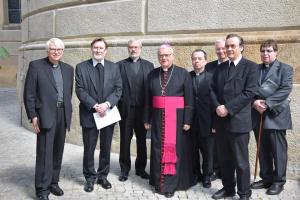 Following the appointment of Archbishop Heiner Koch (pictured at left with Berlin’s cathedral chapter) to Berlin, the other bishops of eastern Germany have expressed concern at the trend that seems to be developing, a tendency for bishops in that part of the country to be reassigned within a few years after being made ordinaries there. And they have a point.
Following the appointment of Archbishop Heiner Koch (pictured at left with Berlin’s cathedral chapter) to Berlin, the other bishops of eastern Germany have expressed concern at the trend that seems to be developing, a tendency for bishops in that part of the country to be reassigned within a few years after being made ordinaries there. And they have a point.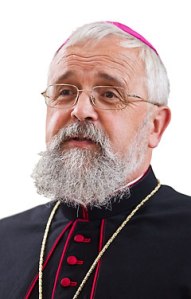 In fact, the eastern German episcopate as a whole is young. Only Magdeburg’s Gerhard Feige (pictured) has a decade as bishop behind him, and the next senior is Görlitz’s Wolfgang Ipolt, ordinary for a mere four years.
In fact, the eastern German episcopate as a whole is young. Only Magdeburg’s Gerhard Feige (pictured) has a decade as bishop behind him, and the next senior is Görlitz’s Wolfgang Ipolt, ordinary for a mere four years. Just to show that not all German bishops intent on upending all Catholic teaching, as some media would have us believe, here is a translation of a letter sent by five bishops to the bishop of Passau, msgr. Stefan Oster, after the latter criticised the call from the Central Committee of German Catholics (the ZdK) to start blessing same-sex relationships as well as new relationships of divorced Catholics. The ZdK is a lay movement recognised by the Bishops’ Conference to promote the lay apostolate in the Church. Bishop Oster criticised their proposal by pointing out the Biblical basis of marriage and the understanding of Biblical revelation. He also pointed out that the “use” of Pope Francis to support the calls for change has no basis in reality.
Just to show that not all German bishops intent on upending all Catholic teaching, as some media would have us believe, here is a translation of a letter sent by five bishops to the bishop of Passau, msgr. Stefan Oster, after the latter criticised the call from the Central Committee of German Catholics (the ZdK) to start blessing same-sex relationships as well as new relationships of divorced Catholics. The ZdK is a lay movement recognised by the Bishops’ Conference to promote the lay apostolate in the Church. Bishop Oster criticised their proposal by pointing out the Biblical basis of marriage and the understanding of Biblical revelation. He also pointed out that the “use” of Pope Francis to support the calls for change has no basis in reality. Bishop Florian Wörner was consecrated in Augsburg by Bishop Konrad Zdarsa (Wörner pictured at left at the closing of the consecration Mass). He is now one of Augsburg’s two auxiliary bishops. In
Bishop Florian Wörner was consecrated in Augsburg by Bishop Konrad Zdarsa (Wörner pictured at left at the closing of the consecration Mass). He is now one of Augsburg’s two auxiliary bishops. In  72-year-old Bishop Wehrle retires for health reasons. The archdiocese will be requesting a successor, as it tries to maintain three active auxiliaries in lieu of the dioceses size. Auxiliary Bishop Rainer Klug and Bernd Uhl remain to assist Archbishop Robert Zollitsch. Both Zollitsch and Klug are 73, so this retirement heralds an almost complete change in diocesan leadership over the coming years.
72-year-old Bishop Wehrle retires for health reasons. The archdiocese will be requesting a successor, as it tries to maintain three active auxiliaries in lieu of the dioceses size. Auxiliary Bishop Rainer Klug and Bernd Uhl remain to assist Archbishop Robert Zollitsch. Both Zollitsch and Klug are 73, so this retirement heralds an almost complete change in diocesan leadership over the coming years. As the slow generational shift progresses among the bishops of Europe, the Diocese of Augsburg in Germany gains an auxiliary bishop who will be the youngest in all of northwestern Europe, and the 12th youngest worldwide. 42-year-old Bishop elect Florian Wörner will join ordinary Bishop Konrad Zdarsa and fellow auxiliary Bishop Anton Losinger in the Augsburger curia.
As the slow generational shift progresses among the bishops of Europe, the Diocese of Augsburg in Germany gains an auxiliary bishop who will be the youngest in all of northwestern Europe, and the 12th youngest worldwide. 42-year-old Bishop elect Florian Wörner will join ordinary Bishop Konrad Zdarsa and fellow auxiliary Bishop Anton Losinger in the Augsburger curia. With yesterday’s retirement of Bishop Joachim Reinelt the Berlin Church Province is close to completing a significant generational shift. For the first time since the province, which consists of the Metropolitan Archdiocese of Berlin and the Dioceses of Görlitz and Dresden-Meiβen, was established in its modern form in 1994*, a new generation of bishops is set to take over.
With yesterday’s retirement of Bishop Joachim Reinelt the Berlin Church Province is close to completing a significant generational shift. For the first time since the province, which consists of the Metropolitan Archdiocese of Berlin and the Dioceses of Görlitz and Dresden-Meiβen, was established in its modern form in 1994*, a new generation of bishops is set to take over.